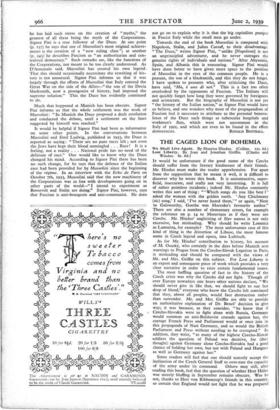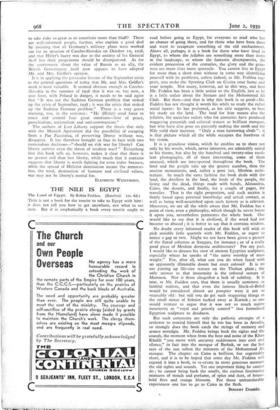THE CAGED LION OF BOHEMIA
IT would be unfortunate if the good name of the Czechs should suffer from the literary kindnesses of their friends. Mr. Hindus must make the reader apprehensive. For apart from the supposition that he meant it well, it is difficult to discover why he wrote this book. It is uninstructive, super- ficial, inaccurate, and really not very interesting. It is full of rather pointless incidents ; indeed Mr. Hindus constantly writes this sort of thing: " Which songs do you like best ? ' asked the woman with the golden tooth. Any Chiclunany (sic) song,' I said, I've never heard them,' " or again, " Next to Galsworthy, Goethe was Marenka's favourite author." There are also a number of elementary errors, for example the reference on p. 14 to Moravians as if they were not Czechs. Mr. Hindus' anglicising of Slav names is not only excessive, but misleading. Why should he write Lomnica as Lumnitsa, for example? The most unfortunate case of this kind of thing is the distortion of Libuse, the most famous name in Czech legend and opera, into Lubitsch.
As for Mr. Hindus' contribution to history, his account of M. Osusk3"7, who certainly in the days before Munich sent warnings to Prague from the Czecho-Slovak Legation in Paris, is misleading and should be compared with the views of Mr. and Mrs. Griffin on this subject. For Lost Liberty is an expert and consequent piece of work which provides a very clear narrative in order to raise certain fundamental issues.
The most baffling question of fact in the history of the Czech crisis was why the Czechs did not fight. Though all over Europe nowadays one hears other nations declare, " We should never give in like that, we should fight to our last drop of blood," everyone who knew the Czechs felt convinced that they, above all peoples, would face destruction rather than surrender. Mr. and Mrs. Griffin are able to provide an authoritative explanation of Dr. Benei' decision to give way; it was because, as they consider, " he knew that if Czecho-Slovakia were to fight alone with Russia, Germany would summon an anti-Bolshevist crusade against her, the corrupt French Press and Parliament would at once join in this propaganda of Nazi Germany, and so would the British Parliament and Press without needing to be corrupted." In addition, they write, " to many of the highest Czecho-Slovak soldiers the question of Poland was decisive, for (the)" thought) against Germany alone Czecho-Slovakia had a good chance of holding her own, but not with Poland and Hungary as well as Germany against her."
Some readers will feel that one should scarcely accept the inclination of the Czech General Staff to over-rate the capacity of the army under its command. Others may still, after reading this book, feel that the question of whether Herr Hitler was merely bluffing in September remains obscure. Was he not, thanks to Herr von Ribbentrop's friends in this country, so certain that England would not fight that he was prepared
to take risks so great as to constitute more than bluff? There are well-informed people, further, who explain a good deal by insisting that all Germany's military plans were worked out for an invasion of Czecho-Slovakia on October 1st, 1938, and that Hitler's hurry was due to the anxiety of his General Staff lest their programme should be disorganised. As for the controversy about the value of Russia as an ally, the British Government itself now appears to have adopted Mr. and Mrs. Griffin's opinion.
It is in applying the particular lessons of the September crisis to the general questions of today that Mr. and Mrs. Griffin's work is most valuable. It seemed obvious enough in Czecho- Slovakia in the summer of 1938 that it was so, but now, a year later, with Poland in danger, it needs to be said again that ” It was not the Sudeten German problem that stoked up the crisis of September, 1938 ; it was the crisis that stoked up the Sudeten German problem." There is a very grave warning, too, in the sentence : "He (Hitler) used force to rouse and control four great emotions—love of peace, parochialism, nationalism and anti-communism."
The authors of Lost Liberty support the thesis that only with the Munich Agreement did the possibility of escaping from a Pax Fascistica, of preserving liberty without war, disappear. It has therefore brought us face to face with two tremendous decisions—" should we risk war for liberty? Can liberty survive even the threat of modern war? " Everything that this book tells us, however, makes it clear that there is no greater evil than lost liberty, while much that it contains suggests that liberty is worth fighting for even today because, while the spread of Hitlerist domination means the remorse- less, the total, destruction of humane and civilised values, war may not be liberty's mortal foe.
ELIZABETH WISKEMANN.











































 Previous page
Previous page